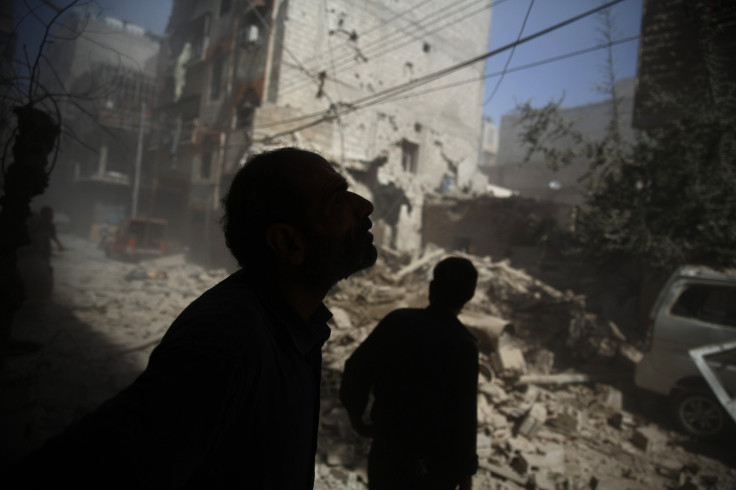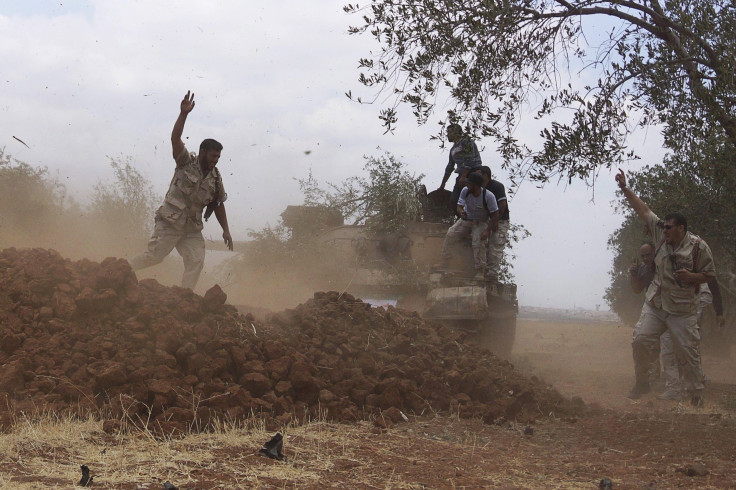Russian Airstrikes In Syria: As Moscow Enters Conflict, Hillary Clinton, Barack Obama Divided Over What To Do About It

Russia’s deployment of air power in Syria is sending militants, rebels and civilians diving for shelter while providing support to Syria’s struggling army. But Moscow’s new air campaign to support Iran’s expanded role on the ground in Syria has experts wondering how Russia’s unprecedented role will play out.
U.S. leaders are divided on how to respond to the latest developments in Syria’s four-year-old civil war, which has killed hundreds of thousands of people and sent millions of refugees fleeing from the country.
“We are basically novices in this type of war,” Ruslan Pukhov, a defense expert at the Moscow-based Centre for Analysis of Strategies and Technologies, told the Washington Post for a report published Saturday. “And when you are a novice, you are doomed to commit some kinds of mistakes -- hopefully not deadly ones, but obviously there is a risk of casualties.”
Pukhov and other Russian defense experts said this is not only the first time Russia has implemented a policy of using fighter jets to weaken an enemy force to assist a foreign power -- President Bashar Assad’s government -- it’s also unprecedented for Russia to follow the U.S. into a regional conflict.
Russia began hitting targets in Syria Wednesday, which led to condemnation from U.S. Sen. John McCain, a member of the Senate’s Armed Services Committee, who accused Moscow of targeting Syrian rebels that the U.S. backs. And on Friday the Wall Street Journal reported that Iran was expanding its already sizable presence in the country, including the possible deployment of Iranian commanders and military advisers.

Both Tehran and Moscow support Assad’s government, which is viewed as illegitimate by the U.S., Europe and Arab states. But they side with the U.S. and Europe in viewing militants of the Islamic State group, also known as ISIS, as a common enemy. Amid this tangle of overlapping and opposing objectives, U.S. leaders are divided on what to do.
Should the U.S. confront Russia’s new role, straining already tense relations between Washington and Moscow? Hillary Clinton thinks so.
“I personally would be advocating now for a no-fly zone and humanitarian corridors to try to stop the carnage on the ground and from the air,” the presidential candidate told WHDH-TV in Boston Friday. Like McCain, and former Secretary of State John Kerry, Clinton has said she believes Moscow is using the cover of targeting Islamist militants to assist Assad by also bombing U.S.-backed Syrian rebels.
The White House has rejected the idea of imposing a no-fly zone over Syria, citing logistical concerns about how to enforce it, and accused Clinton, President Barack Obama’s former head of U.S. foreign relations, of using the no-fly zone issue as a campaign tactic.
“She was, obviously, my secretary of state,” Obama said at a Friday press conference. “But I also think that there’s a difference between running for president and being president, and the decisions that are being made and the discussions that I’m having with the Joint Chiefs become much more specific and require, I think, a different kind of judgment.”
On Saturday, U.S. Sen. Bernie Sanders, the leftist Vermont Independent presidential candidate, sided with Obama on the issue.
"I oppose, at this point, a unilateral American no-fly zone in Syria, which could get us more deeply involved in that horrible civil war and lead to a never-ending U.S. entanglement in that region," Sanders said in a statement to CNN. "We do not want to make a very complex situation in Syria even worse.”
The senator said he supports Obama’s efforts to combat the ISIS presence in Syria while supporting Syrian rebels fighting both Islamist militants and Assad’s army.
Meanwhile, as the U.S. digests Russia’s new role in the Syrian conflict, the Russian defense ministry announced Saturday it had bombed nine ISIS positions near the terror group's de facto capital in Raqqa. Russian jets conducted 20 airstrikes Saturday in and around the northern Syrian city, CNN said, citing Russian officials.
© Copyright IBTimes 2025. All rights reserved.






















